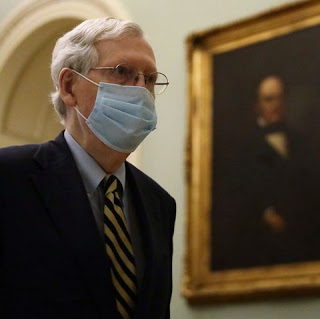As masks become controversial, evidence mounts that they work

Senate Majority Leader Mitch McConnell wears a mask and urges others to do so. (Photo by Alex Wong, Getty Images)
—–
“Several new studies published this month support wearing masks to curb the transmission of the novel coronavirus,” The Washington Post reports. The broadest piece of research “concluded that data from 172 observational studies indicate wearing face masks reduces the risk of coronavirus infection.”
Masks appear to work best when coupled with hand-washing and physical distancing, said a review of reports by epidemiologist-physician Holger Schünemann and his colleagues at McMaster University in Ontario. “Most studies in the review analyzed face masks in hospitals or other medical settings, and some took place in households where an infected person lived,” the Post reports.
Being exact will be difficult. “The gold standard in science — a randomized, double-blinded controlled trial — is impossible to conduct in a pandemic,” the reporters point out. So, researchers collect information from many small, observational reports, which are generally uncontrolled and subject to outside factors that may or may not be measurable.
Jeffrey Shaman, an epidemiologist at Columbia University, told the Post that South Korea, Taiwan and Vietnam, which had high rates of mask use early in the pandemic, “have had better success squashing the virus and keeping their economies going.”
“When you are going about in the course of normal activities like breathing, talking and singing, you expel these particles into the environment,” Bischoff said. “You want to create a seal.”
Andrew Noymer, a University of California-Irvine professor of population health and disease prevention, told the Post, “Most of anti-maskers seem to be politicians who do not have scientific experience.”